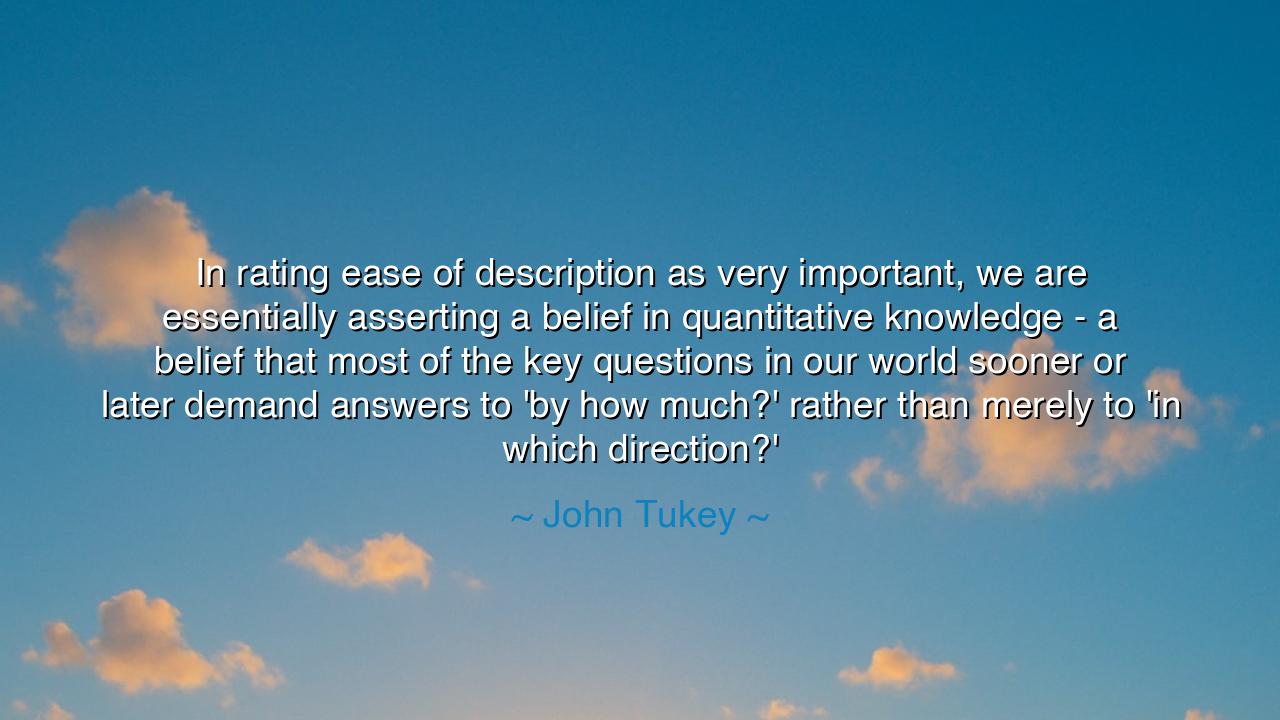
In rating ease of description as very important, we are
In rating ease of description as very important, we are essentially asserting a belief in quantitative knowledge - a belief that most of the key questions in our world sooner or later demand answers to 'by how much?' rather than merely to 'in which direction?'






Hear, O seekers of truth, the words of John Tukey, master of numbers and father of modern statistics: “In rating ease of description as very important, we are essentially asserting a belief in quantitative knowledge—a belief that most of the key questions in our world sooner or later demand answers to ‘by how much?’ rather than merely to ‘in which direction?’” This teaching is both subtle and profound. It warns us that truth is not complete when we know only the path or tendency of a thing—we must also measure its weight, its scope, its magnitude. For in the difference between direction and measure lies the power to act wisely.
The origin of this utterance springs from Tukey’s lifelong labor in the field of statistics, where numbers transform vague impressions into clarity. He saw that many are content to know only whether something increases or decreases, rises or falls. But such knowledge is like a shadow without substance. To guide human endeavor, one must ask, “By how much does it rise? By how much does it fall?” Only then can our judgments be steady, our actions effective, our understanding true. Quantitative knowledge is not mere detail; it is the anchor of wisdom in a world awash with uncertainty.
Consider the story of the ancient mariners. To sail the seas, it was not enough to know merely the direction of the stars. They had to measure distances, calculate angles, and estimate speed. Without this, they would be lost in endless waters. By turning vague guidance into precise measurement, they crossed oceans and discovered new worlds. So it is with all human knowledge: direction is the beginning, but measurement is the fulfillment.
Or ponder the case of medicine. For centuries, healers knew that certain herbs might help, or that certain fevers might subside in time. But until physicians learned to measure dosage—how much of the herb, how much of the treatment—healing was uncertain and often dangerous. When quantitative knowledge entered medicine, it transformed the art into science, and lives were saved by the precision of numbers. Tukey’s words remind us: to ask only “does it help?” is not enough; we must ask “how much does it help, and for how long?”
Thus, Tukey speaks not only to scholars, but to all of life. When a nation asks whether its economy is growing, the true wisdom lies not merely in knowing the direction—growth or decline—but in asking by how much? When a teacher asks whether students are learning, it is not enough to know that some progress exists; one must measure the progress to see its depth. When a man examines his own life, he must not only know whether he has improved in virtue, but by how much he has grown in patience, in courage, in wisdom.
The lesson is clear: vague knowledge guides little; precise knowledge guides greatly. Direction without measurement is like a map without scale—useful for orientation, but insufficient for the journey. Therefore, cultivate the discipline of asking “by how much?” in all things. Do not be content with impressions, but seek the solid ground of evidence, the firm footing of measure.
Practical action lies before you. In your work, quantify your progress; in your studies, measure your understanding; in your relationships, take note not only of whether love grows, but of how deeply and consistently it does. When you make judgments, anchor them not in vague trends but in clear evidence. For in doing so, you honor Tukey’s teaching: to turn shadows into shapes, to turn guesses into truths, and to turn direction into destiny.
So let these words be etched upon your heart: quantitative knowledge is not a cold burden, but a torch that lights the path of reason. Ask not only which way? but also how far? and how much? In this lies the strength of science, the clarity of wisdom, and the power to fulfill the great questions of our world.






AAdministratorAdministrator
Welcome, honored guests. Please leave a comment, we will respond soon